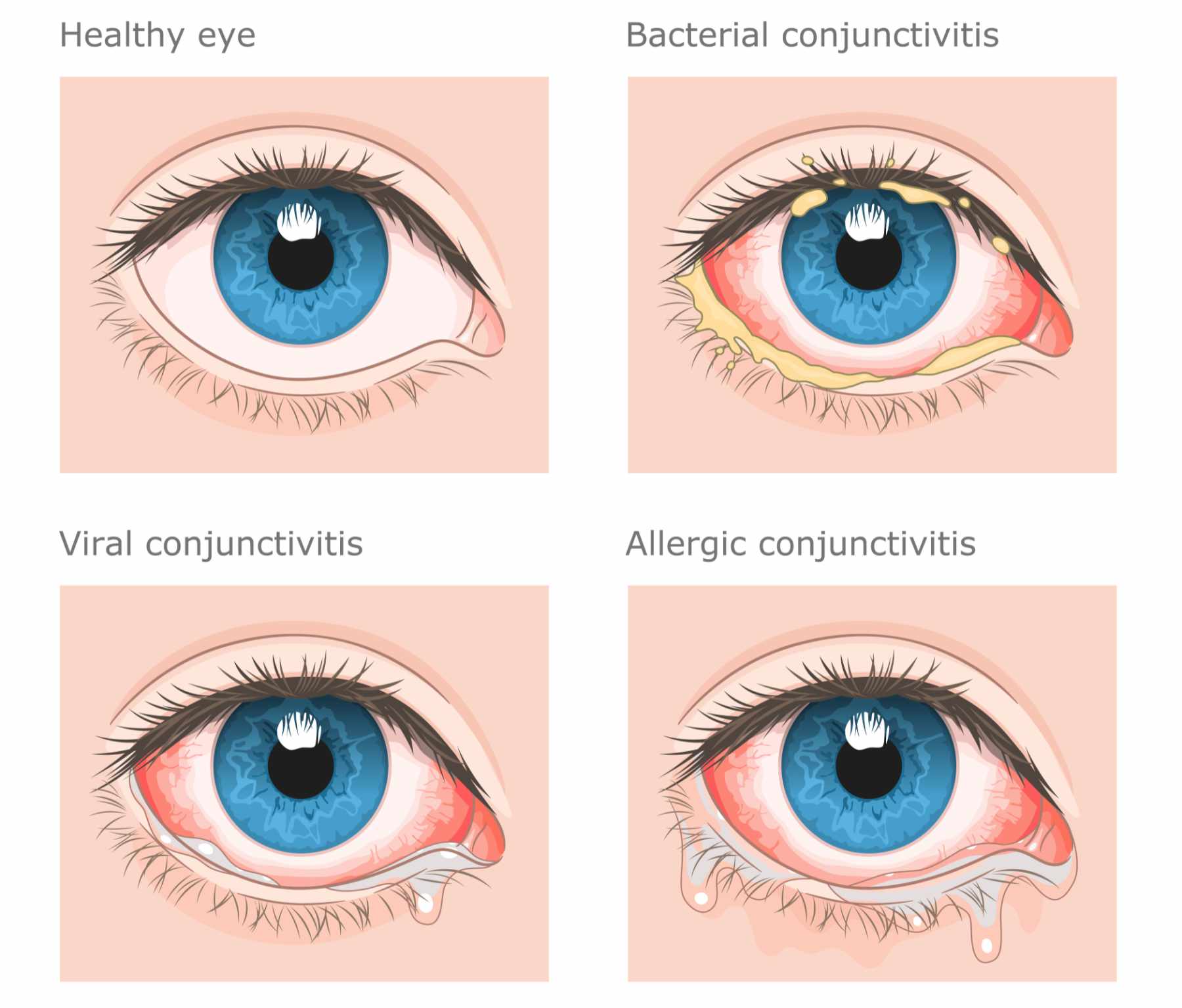Pink Eye (Conjunctivitis)
Did you know that ChatRx uses advanced AI to diagnose Pink eye and prescribe medications as needed?
Overview
Pink eye, or conjunctivitis, is a highly contagious inflammation of the conjunctiva, the clear membrane that covers the white part of the eye and the inside of the eyelid. This condition can be caused by various factors, including bacterial or viral infections, allergies, or irritants, and is characterized by redness, itchiness, and a discharge from the affected eye. Prompt diagnosis and appropriate treatment are essential to managing the symptoms and preventing the spread of pink eye.
Do you feel like you have Pink eye? No worries, just use the ChatRx AI-powered system to assess your symptoms!
AI-Powered Symptom Assessment Coming in Spring 2025!

What is Pink Eye?
- A highly contagious inflammation of the conjunctiva, the clear membrane covering the white part of the eye and the inside of the eyelid
- Can be caused by bacterial or viral infections, allergies, or irritants
- Characterized by redness, itchiness, and a discharge from the affected eye
Causes of Pink Eye
- Bacterial infections, such as Staphylococcus or Streptococcus bacteria
- Viral infections, including adenoviruses and the herpes simplex virus
- Allergic reactions to substances like pollen, dust, or pet dander
- Exposure to irritants, such as chemicals or smoke
Preventing Pink Eye
- Practice good hygiene, including frequent hand washing and avoiding touching or rubbing the eyes
- Avoid sharing personal items, such as towels, washcloths, or eye makeup
- Properly clean and disinfect any contaminated surfaces or objects
- Seek medical attention if symptoms persist or worsen
- Maintain a healthy lifestyle with a balanced diet and regular exercise
Dealing with Pink Eye?
AI-Powered Pink Eye (Conjunctivitis) Treatment Coming This Spring!
Start Your Pink Eye Assessment Now
Symptoms of Pink Eye
- Redness, itchiness, and burning sensation in the affected eye
- Increased tear production or a thick, sticky discharge from the eye
- Sensitivity to light and blurred vision in some cases
- Swelling of the eyelid or surrounding area
Treating Pink Eye
- Over-the-counter eye drops or ointments containing antihistamines or decongestants to alleviate symptoms
- Prescription-strength antibiotic eye drops or ointments for bacterial conjunctivitis
- Antiviral eye drops or oral medications for viral conjunctivitis
- Treating the underlying cause, such as allergies or irritants
Self-Care for Pink Eye
- Apply cold compresses to the affected eye to reduce swelling and discomfort
- Avoid wearing contact lenses until the infection has cleared
- Maintain good hygiene and avoid sharing personal items to prevent the spread of the infection
Feeling Unwell?
AI-Powered Symptom Assessment Coming in Spring 2025!
Antibiotics and Antivirals for Pink Eye
- Prescription-strength antibiotic eye drops or ointments, such as erythromycin or sulfacetamide, for bacterial conjunctivitis
- Antiviral eye drops or oral medications, like acyclovir, for viral conjunctivitis
Risk Factors for Pink Eye
- Close contact with individuals who have a contagious form of pink eye
- Exposure to irritants or allergens that can trigger an inflammatory response
- Weakened immune system or underlying medical conditions that increase susceptibility to infections
Summary
Pink eye is a highly contagious condition that can be effectively managed through proper treatment and prevention measures. By understanding the causes, symptoms, and appropriate care for this eye infection, individuals can take steps to protect themselves and prevent the spread of pink eye to others.
Frequently Asked Questions
Viral Pink Eye often makes your eyes red and watery and spreads easily, especially to both eyes. Bacterial Pink Eye causes thick yellow or green discharge that might make your eyelids stick together in the morning. Allergic Pink Eye is usually itchy, watery, and happens with sneezing or a runny nose. If you’re not sure, ChatRx can assess your symptoms and suggest remedies or treatment options, like antibiotics for bacterial infections.
Most of the time, Pink Eye doesn’t cause lasting damage. But if it’s not treated—or if it’s caused by serious viruses like herpes—it could lead to complications that affect your vision. ChatRx can help you figure out if your condition needs medical attention or specific treatments to keep your eyes safe.
No, wearing contact lenses with Pink Eye can make your symptoms worse and spread the infection. Wait until your eyes are fully healed before using lenses again. Be sure to clean or replace your lenses, cases, and solutions to avoid reinfection.
Pink Eye can spread very quickly, especially in schools or crowded places. It spreads through direct contact with an infected person, touching contaminated surfaces, or sharing items like towels or makeup. Washing your hands often and avoiding close contact with others can help stop the spread.
Yes, Pink Eye can return if you’re exposed to the same bacteria, virus, or irritant. It can also happen if the underlying cause, like allergies, hasn’t been treated. Practicing good hygiene and avoiding shared items can help prevent reinfection.
If your Pink Eye is caused by bacteria or a virus, it’s best to stay home because it spreads easily. Once your symptoms improve or your doctor says it’s safe, you can return. Allergic Pink Eye isn’t contagious, so you don’t need to stay home in that case. Not sure if it’s contagious? ChatRx can help assess your condition and provide advice.
If your child has Pink Eye, talk to a doctor or use ChatRx to figure out the cause and the best treatment. Keep them home from school or daycare if it’s bacterial or viral, as these types are highly contagious. However, if their Pink Eye is caused by allergies or irritants, it’s not contagious, and they can usually return to their activities.
Over-the-counter drops can help relieve symptoms, especially for allergic Pink Eye, but they won’t cure bacterial or viral Pink Eye. For bacterial infections, antibiotics may be needed, while viral infections usually clear up on their own. ChatRx can recommend remedies, including antibiotics, if needed, based on your symptoms.